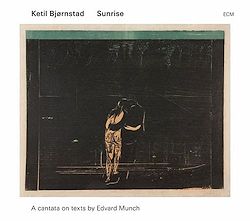Sunrise
- A cantata on texts by Edvard Munch (2011) [78:31]
Kari Bremnes (vocal)
Aage Kvalbein (cello)
Matias Bjørnstad (alto saxophone)
Bjørn Kjellemyr (bass)
Hans-Kristian Kjos Sørensen (percussion)
Ketil Bjørnstad (piano)
Oslo Chamber Choir/Egil Fossum
rec. April 2012, Rainbow Studio, Oslo
ECM RECORDS ECM 2336
[78:31]
Prolific writer and musician Ketil Bjørnstad has plenty of history with the ECM label, and has also been associated with Edvard Munch through a novel
called Historien om Edvard Munch.
Better known as a painter and famous for his iconic work ‘The Cry’ of ‘The Scream’, Munch’s writings often stem from his descriptions of the subject of a
canvas, composed before commencing work with the brush. His texts are influenced by August Strindberg and others, but with complete translations in English
in the booklet you can read its content for yourself, though the singing is all in the original Norwegian.
The contrasting moods and subjects of the texts mean that this is more or less a cycle of songs both solo and choral with instrumental intermezzos rather
than a narrative cantata in the more expected sense. The settings are often heavily jazz coloured, which is fine. Accessible melodies and gentle,
low-impact harmonic content make this into something which can have wide popular appeal.
I have no problem with any kind of genre, and the quality of the music here is of course of a high level. My problem with this is the homogeneity with
which Munch’s striking imagery has been set. If you weren’t following the text in the booklet you would gain absolutely nothing from a song whose opening
carries the somewhat threatening image; “I am walking along a narrow path/with a sheer drop on one side. The depths of the sea there/are unfathomable.” The
laid-back ballad which is meant to convey this ultimately doom-laden dream of the impossibility of escape seems to bear no relationship with the words
whatsoever.
This is but one text chosen pretty much at random, but this whole album is chock full of this kind of text-eschewing banality. You could stage this quite
nicely as a school theatre production and perhaps get away with it, but in longing for something which engages with the more powerful imagery and impact of
these texts I feel cheated and quite fed-up with the whole thing.
There are some beautiful sounds here, but along with the rest the impression is almost achieved that the gorgeous atmosphere of a song like Open Window occurs sort-of-by-chance. This is perhaps less than fair, but any real drama in the piece as a whole only emerges from the ‘free
improvisation’ style of some of the Resitativ tracks. Again, I’m not against this kind of contribution, but it would have been refreshing to have
some of this kind of energy in the all too cloying sentimentality which infuses so many of the songs. The Separation for instance, is lushly
dripping with something, but whatever it is it isn’t “his heart – which bleeds and aches like an ever open wound.” My point is made once again in a
comparison with this and the similar feel given to the ultimately optimistic but thrillingly scary Gravestone, the promise that “out of my rotting
corpse would grow plants and trees” delivered with almost identical pallid mundaneness.
It’s no doubt clear by now that I’m probably not the right person to be reviewing this CD, and I offer my apologies for this mismatch. There is plenty of
fine musicianship in the recording, and the low-key singing of Kari Bremnes is perfect for the solo songs. I would be the first to defend Ketil Bjørnstad
to make whatever kind of music he likes, but in this case, other than exposing a side of Edvard Munch you may not have previously known about, he does the
poor artist’s written work very few favours.
Dominy Clements
